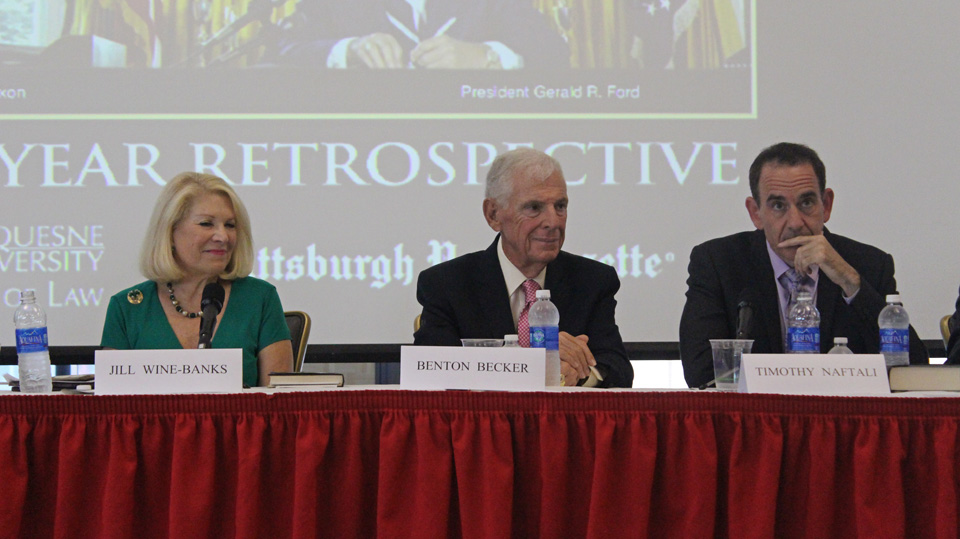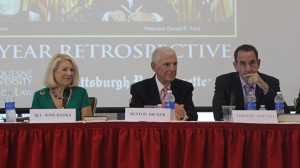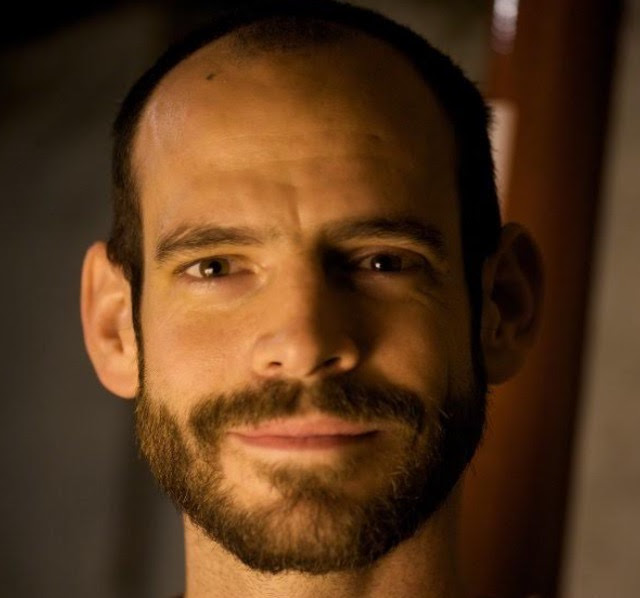

By Jessica Nath | The Duquesne Duke
On the 40th anniversary of President Gerald Ford’s pardon of Richard Nixon Monday, Duquesne students and alumni, lawyers and even senators crowded into the Power Center Ballroom to hear from officials who played important roles in Watergate’s consequences and Ford’s decision.
Ford appeared on national television on Sept. 8, 1974 to grant former President Nixon a complete pardon for his actions and involvement in the infamous Watergate scandal. The pardon plagued Ford’s political legacy, as some thought he organized a deal with Nixon behind closed doors.
The panel discussion was organized by Ken Gormley, dean of Duquesne’s School of Law, and David Shribman, executive editor of the Pittsburgh Post-Gazette.
Gormley, who interviewed Ford and studied Watergate while writing a biography of Archibald Cox, said his opinion of the pardon has changed over the years. Cox is famous for subpoenaing the key Watergate tapes.
“After interviewing President Ford, I was struck by the passion with which he explained his reasons for granting the pardon,” Gormley said.
The discussion began with a brief recount of Watergate by Timothy Naftali, former director of the Richard M. Nixon Presidential Library. Naftali created a display about the scandal at the library in 2011.
He explained, much like his display does, how several burglars were arrested June 17, 1972, for trying to “bug” the office of the Democratic National Committee in the Watergate hotel.
The burglars were connected to Nixon’s office, leading to the scandal that forced him to resign.
Benton Becker, former special counsel to Ford, told the story of how the then-new president asked him to research what exactly a pardon meant legally. Upon finding that it was a legal admission of guilt, Becker was sent to “basically” read Nixon his Miranda Rights in California.
While many believe Ford’s pardon was part of the Watergate cover-up, Becker said Nixon actually didn’t want to take it because of its implications of guilt.
Becker said it’s important to continue talking about Watergate and its consequences.
“Every four years we elect new presidents, and we should know what Article II of the Constitution says about the power of the congress to impeach,” Becker said.
Article II declares that anyone in office – including the president and vice president – can be impeached and convicted for treason, bribery or other serious crimes.
Becker said his respect for Ford and his decision to pardon Nixon hasn’t waivered over the years.
“It’s gotten stronger,” Becker said. “I’ve got a strong belief that he is a great man of courage and deserves recognition from the public for that.”
Jill Wine-Banks, another panelist, is known for cross-examining Nixon’s secretary Rose Mary Woods in the grand jury about the 18 and a half-minute gap on one of the Watergate tapes.
She was also the only female on the team trying to indict Nixon, forcing her to fight another battle on top of the trial – sexism.
“I would go into court, and the clerk would say ‘Whose secretary are you?’” Wine-Banks said. “And I couldn’t even be mad because statistically, it was quite likely that I was someone’s secretary.”
According to Wine-Banks, only two percent of women were lawyers at the time, and there was a five percent quota for women in her law class.
“Judge Sirica, when I was cross examining Rose Mary Woods, said ‘Now ladies, we have enough problems in the court without two women arguing,’” Wine-Banks recounted. “I was cross examining her, and she was falling apart, it was exactly what I wanted.”
She said it’s important to keep the conversation open because society can learn from history so the same mistakes aren’t made again.
However, even though she called the pardon a “courageous” act on Ford’s part, she said she still believes the country could have survived a Nixon trial.
“When you listen to what was said today, the arguments for why it was the ‘right thing’ for the country are very emotionally appealing,” Wine-Banks said. “But I have a higher opinion of what the country could have withstood, and I think that ultimately, the truth and equal justice under law would have done better service.”
Bobbi Jo Wagner, a Duquesne alumni and defense attorney in Pittsburgh, said she was struck during the panel by learning how Nixon used different offices inside the government.




